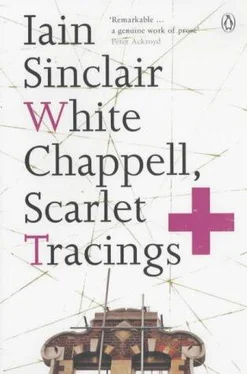I could refer to this process as the erasure of the inessential; but I could go further, leap beyond, it does come on me, that it is the obvious and the most apparent that is not to be stated. That which is present before our eyes needs no elaboration. It is the invisible that moves us. We arrive at the essence by describing that which surrounds it. To describe the invisible itself would be to erase its power over us. If I listed all the forces that were around me, the rights, passions, feelings, influences — I say, all — I would make my own presence wholly unnecessary. By ceasing to be I would however be more powerfully and truly present than I had ever been before. I would be disencumbered, no longer prey to the physical laws of the universe and the grinding tyranny of time. I should never again be before your eyes, a succession of negatives and qualifications, I should be within you, around you, beyond you. In erasing myself I should truly become.
So you see there is a compulsion on me, a necessity — the universal compulsion and necessity by which I believe all deeper seeing has come — to see human life differently, if I am to see it at all. That which is visible in it — is not it. I must see more if I am to feel I see it. I must see some hidden things that seem not there at all, but are there, though I will never see them.
Now, the fact that has arrested me in social life — perhaps it is emphatically in modern social life, though perhaps not — is the discord between people and what they do; how such people can do such things. This is the problem. What I am perhaps more conscious of than most, is the evil of this good life. And this is, I suppose, the happy fruit of my sojourn in Whitechapel in my youth.
I discovered then that there was a force that operates upon us, a force that our deeds can never describe; perhaps our deeds even deflect that force from its purpose. What is that purpose? It is not to be spoken of — other than by stating: it is that which we choose to leave out. We are now far beyond all notions of good and evil, all merely human morality. This new Heaven is not for greenhouses and carriages. There are no high walls around it. We have prepared ourselves for another ‘invisible life’ but that world has slipped away. When we have surrounded it — then it is gone. And we are the shape of that absence.
Dear Carrie, it is assuredly true that some men and some women will be alive and remain to the coming of the Lord; the very last epoch of human life will be witnessed by some eyes and hailed, or wailed (most likely at first) by some hearts incredulous and incapable of believing that they can be the witnesses of the last stage, the triumph. Then assuredly, too, the last stage before the last stage will be witnessed by some eyes, and trembled at, and mourned over, and disbelieved by some weak and troubled minds. Why should they not be yours and mine?
Your loving brother,
James
St Michael’s, The Azores
November 1875
A TRIBUTE
My dear Son,
Not Corvo, nor Flores.
Not Pico. It is at St Michael’s,
almost beyond the pull of
Europe, those tired bones, the
dust of its sad history, that I
have at last settled. Not at rest,
halted. The New World is a
rumour across the cold ocean.
I cannot hear the fall of those
bright feathers, the tooth of
the jaguar breaking upon
black stone.
I watch the sun die and feel
that it is my own brain
burning, liquefying, melting,
cooling to lead. Patches shine
like silver. But they do not
remain.
The fire in my skull is out. I
can watch most calmly as my
brain falls out of the heavens,
so abruptly, into the great
dead sea.
This is where I have come
We have heard recently, from
Ponta Delgada on the island of
St Michael’s in the Azores, of
the death of the philosopher
and surgeon, James Hinton.
Acute inflammation of the
brain declared itself, and after a
few days of intense suffering,
in which he knew no one, he
entered into his rest on the
16th December 1875.
It would be a pain to me that
any Memoir of James Hinton
should go forth without a word
of affectionate regard for his
memory from me. It is now
near twenty years ago that our
acquaintance began. Sympathies
in common on the nearest
subjects of human interest
brought us much together.
I recall vividly the earnest
manner with which he would
submit to me his new works,
chapter by chapter. Convinced
as he was that the only deadness
because this is nowhere. Dust.
The dust that man is,
blowing, blowing. On our
lips and in our fingers. The
orange groves! All those sad
lives; those candles, folded
into bulbs of wax. They hang.
But they are green, Howard.
There is no fire of truth in
them. I will not suck on that
green blood.
Our dwelling is a ruin,
nowhere better. The shutters
cannot hold out the dust. I
take it on my spoon.
A little girl of ten came to me
while I was sitting on the
harbour wall and said, ‘Do tell
me about the fluxions.’
I replied at once, ‘Multiply me
17 by 3. So you know 3 times 7
is 21, 1 and carry 2; 3 times 1 is
3 and 2 is 5 equals 51.’
‘Now,’ I said, ‘do you see
what you have done with that
2? You have put it down and
then rubbed it out; it was
necessary to have it, but not
to keep it. Now, a fluxion is
this; it is a thing we need to
have, but are not intended to
hold; a thing we rightly make,
but in order to unmake.’
in nature, the only negative
condition, was man’s selfishness,
his whole life and
thought was to excite a reaction
against it.
Death to him was a purely
human idea. All nature is living.
He was abreast of the best
physiology of the time, and
may be considered as having
done good service in combating
the narrow views that still
prevail, even in high quarters,
and which would raise a barrier
in nature between organic and
inorganic where none exists.
Hinton was not a man of
science, but a philosopher.
Science was to him the servant
of philosophy. He felt himself
to be an interpreter of nature;
not in the Baconian sense by
the collection and arrangement
of facts, the sequences of
causes and effects, but, like the
Hebrew seer of old, penetrating
through appearances to
their central cause.
I remember one occasion
when he came to me full of
emotion, with tears in his eyes,
at a glimpse he had caught of
the universal relation of things
The world is so beautiful I
don’t know what to do; the
condition of that joy is
consenting to bear pain; and
one scarcely dares to say one is
happy, because it makes the
pain confront one, and the
words have lost their meaning
ere they have passed one’s
lips.
I am happy and sorry; and just
now I cannot see a bit
whether that gladness I think
is coming on the earth is
coming or not.
I am not sure I shall be in a
great hurry to come back.
There is no reason to move
from where I am now. Not
even an eyelid, or tongue
over dried lips. Why should I
disturb the pain that is the
only truth?
It is so sad to me that I have
lost the power of helping
those who need worldly aid. I
have tried too much, and
failed; but yet perhaps in that,
Читать дальше












